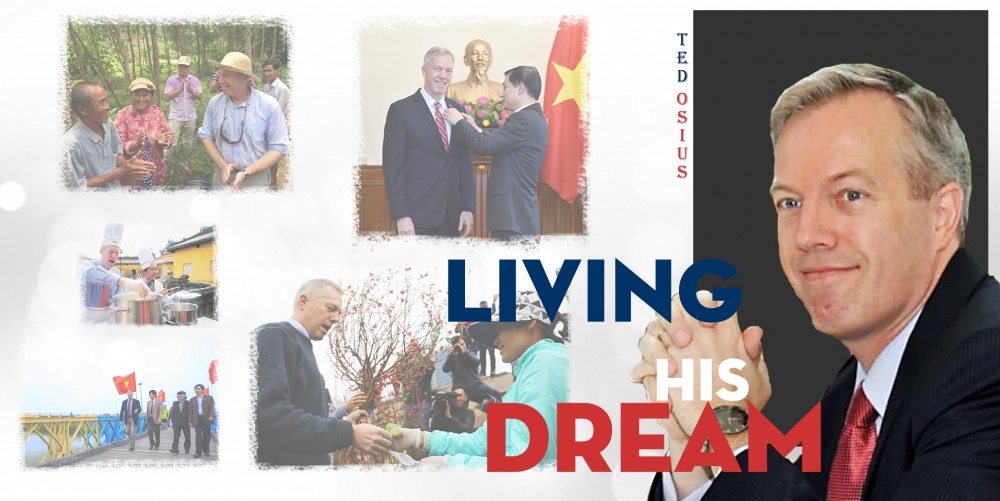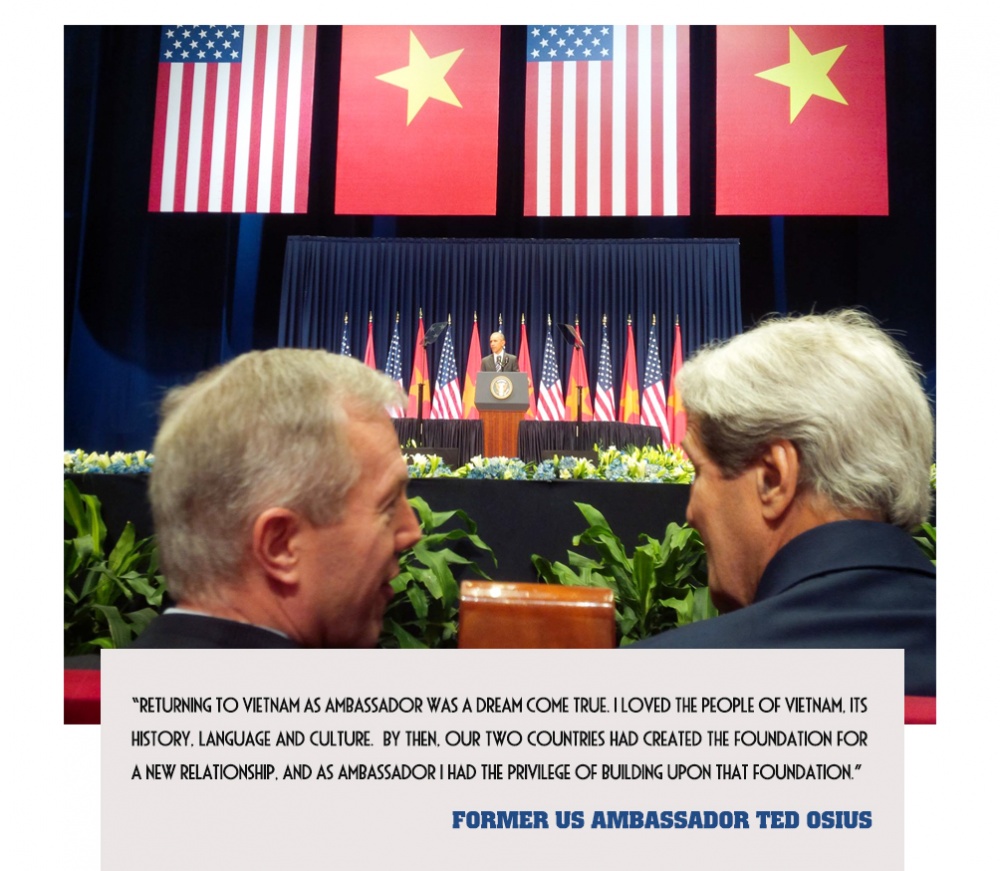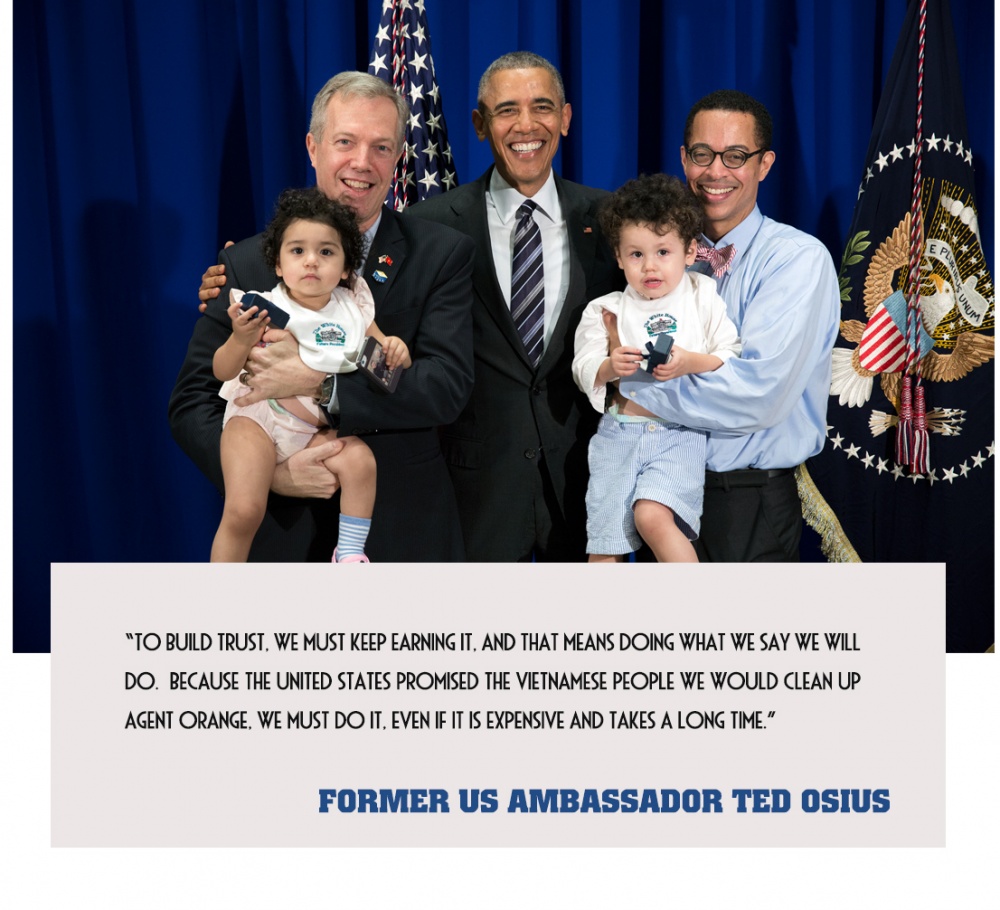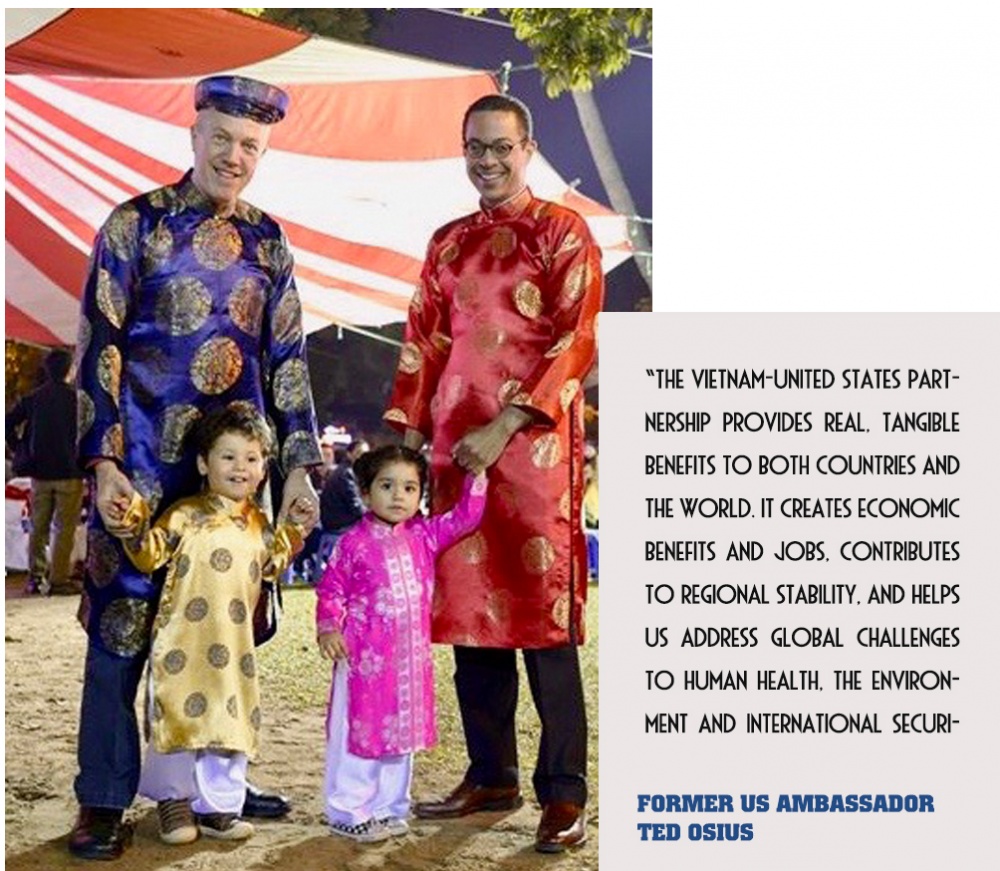 |
Former United States Ambassador to Vietnam Ted Osius shared how he had, and has been living his dream of contributing to the United States – Vietnam bilateral relations.
***
 |
July 11th marked the 25th anniversary of Vietnam – United States establishment of diplomatic relations. As one of the first American diplomats to arrive in Vietnam after the formal establishment in 1996, a former Ambassador of the United States to Vietnam and a great contributor to the bilateral relations, how do you feel about this milestone?
From 1975 to 1995, reconciliation between Washington and Ha Noi progressed slowly. Then, on July 11, 1995, the United States and Vietnam established full diplomatic relations and it seemed our countries could begin anew. As I was studying Vietnamese in preparation for a diplomatic assignment in Ha Noi, I hoped I could help. From my first visit to Vietnam, I knew that its people had chosen not to harbor grudges, but rather to open their arms, even to representatives of a government that had waged a terrible war in their country. Each time my fellow diplomats and I met someone new, we tried to build a bit more of the trust needed to create a partnership.
In 1997, when I first rode my bicycle from north to south, I saw how Vietnamese were turning their country from a ravaged war zone into a strong, prosperous and independent friend of the United States. While the war had left massive scars, if we were honest about our history, we had a chance to encourage reconciliation.
 |
Brave Vietnamese and Americans decided to face the past squarely, to show respect to former adversaries, and to create a better future. They learned how to build trust one step at a time. In the mid-90s, I came to know some of those heroes, including John McCain and John Kerry, Foreign Minister Nguyen Co Thach and Ambassador Le Van Bang. I served on the staff of an American hero, Ambassador Pete Peterson, who spent nearly seven years in Hoa Lo prison and then returned to Ha Noi as President Bill Clinton’s personal representative.
Returning to Vietnam as an ambassador was a dream come true. I loved the people of Vietnam, its history, language and culture. By then, our two countries had created the foundation for a new relationship, and as an ambassador, I had the privilege of building upon that foundation. Leaders in Washington and Ha Noi wanted to make our new partnership work and give it a real substance. Americans and Vietnamese pushed the reconciliation process through joint action on multiple fronts.
As an ambassador, I had the honor of facilitating a 2015 visit to the Oval Office by Party General Secretary Nguyen Phu Trong. I accompanied President Obama on his 2016 visit to Vietnam and joined Prime Minister Nguyen Xuan Phuc on his 2017 trip to New York and Washington. For three years I had lived my dream, and it was the greatest privilege of a long diplomatic career.
 |
Recently, the United States – Vietnam bilateral relations have developed rapidly and comprehensively. In your opinion, what factors contributed to such progression in just 25 years? What is your vision of future Vietnam – United States bilateral relations?
Strategists talk about shared national interests. Economists talk about shared markets. While I spent three decades as a diplomat focused on such shared interests, reconciliation is about something even more fundamental: shared humanity. Together, Vietnamese and Americans learned to better understand and respect each other.
Healing wasn’t easy. Reconciliation requires hard work, courage, compromise, and recognition of the humanity of brothers, sisters, friends and loved ones harmed on both sides. Vietnam and the United States pursued this process every day for 25 years. Together we found the remains of soldiers who perished, blew up unexploded bombs, and cleaned up Agent Orange. Step-by-step, Americans and Vietnamese deepened the pool of trust that allowed us to become, if not allies, at least close economic and security partners.
Still, unfinished business remains. Even as Washington and Ha Noi have reconciled, divisions persist. The war was simultaneously a war for independence, a contest of ideologies and civil war. So, reconciliation had to take place not only between victors and vanquished, but also between north and south, and between Americans of Vietnamese origin and citizens of Vietnam. Reconciliation between the Vietnamese diaspora and the motherland involves deeply emotional matters, including honoring the dead and acknowledging the past horrors. It depends on ties between people: the back-and-forth activities of business people, students, tourists, and family members.
 |
Today, Vietnam participates in more military engagements with the United States than with any other country. Vietnam has twice welcomed a United States aircraft carrier to its shores, and the largest ship in its fleet came from the United States. Vietnam and the United States collaborate on challenges in the South China Sea and North Korea. These actions demonstrate trust, and they advance the process of reconciliation.
To build trust, we must keep earning it, and that means doing what we say we will do. Because the United States promised the Vietnamese people we would clean up Agent Orange, we must do it, even if it is expensive and takes a long time. When we asked Vietnam to join the Trans-Pacific Partnership (TPP) trade agreement, we should have followed through. Sometimes we failed, then picked ourselves up and started again.
A deep, powerful and lasting partnership comes when you build trust, and that means finding where interests converge and then doing things together. The diplomat’s job is to find those shared interests and make them the bases of our actions.
We found that, by addressing environmental challenges, educational reform, peacekeeping or global health together, we were building trust. My team and I showed respect to Vietnam’s history, language and culture. And we showed respect by speaking honestly and directly about even our most profound differences over human rights and religious freedom.
Respect and trust – essential for reconciliation – are neither zero-sum nor transactional. Just as effective diplomacy involves relationships -- not just money and power -- so does progress toward reconciliation. When the United States and Vietnam show respect and build trust, as we have done for 25 years, we create a relationship that benefits enduring shared interests. As it arose from the ashes of war, America’s relationship with Vietnam is unique. Yet our remarkable transformation from enemies to friends shows that, as Pete Peterson said, nothing is impossible.
 |
Your activities prior, during and post your tenure as Ambassador such as having cross-country trip, accompanying President Bill Clinton on his historic visit to Vietnam in 2000, calling for the full lifting of the arms embargo on Vietnam and supporting Vietnam – United States cooperation in education through Fulbright University, showed that Vietnam seemed to have a special place in your heart. Therefore, is there anything you would like to say to the Vietnamese people on this important occasion?
During three decades as a diplomat, I learned that the United States casts a long shadow, and when we show respect it has a big impact. In Vietnam, showing respect meant figuring out what was really, truly important to our Vietnamese partners and taking that seriously. While building trust requires patience and determination, it is worth the effort. The Vietnam - United States partnership provides real, tangible benefits to both countries and the world. It creates economic benefits and jobs, contributes to regional stability, and helps us address global challenges to human health, the environment and international security.
 |
Today, as I work with Google, I see how technology can benefit Vietnamese businesses and people in their daily lives. Whether enabling access to information, breaking geographical barriers to grow small businesses, creating new digital enterprises, or learning new skills, the opportunities are immense. After 25 years, it remains my dream to contribute to Vietnam’s remarkable success and to a hopeful future for its citizens.
